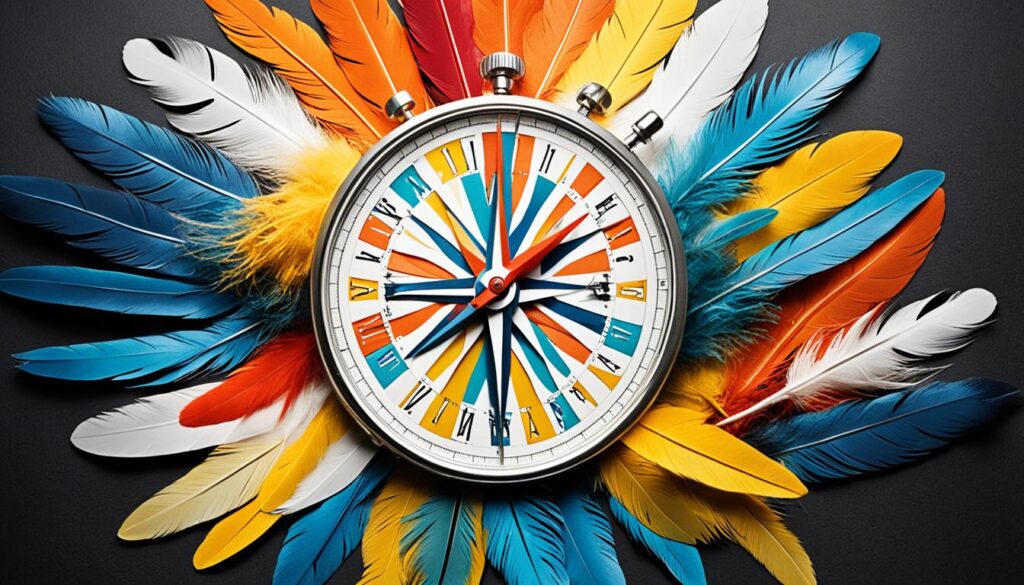Have you ever had a moment of sudden clarity? A moment when everything clicked, and you just knew what to do? It could have been a decision, a problem solved, or a burst of creativity. These moments of insight aren’t random; they come from a deep source of inner wisdom called intuition.
Intuition is like a compass that guides us on our unique path, helping us navigate the complexities of life with ease and confidence. But in our fast-paced world filled with distractions and noise, it can be challenging to tune into our intuition and hear its whispers of guidance. That’s where embracing stillness becomes essential.
Being in stillness allows us to quiet the external chaos and create space for our intuition to speak. It’s about finding moments in our day to slow down, take a deep breath, and listen to the gentle nudges of our inner voice. In stillness, we can hear the whispers of our intuition, guiding us towards actions aligned with our highest good.
When we embrace stillness, we give ourselves the gift of self-discovery and rejuvenation. It is a courageous act that shows we value our inner wisdom and trust in ourselves. By taking the time to rest and reflect, we nourish our souls and gain a deeper understanding of our actions, motivations, and life patterns.
So, let us take a moment together now to pause and be in stillness. Close your eyes, take a deep breath, and allow yourself to sink into the quietude. Feel the gentle rhythm of your breath, the soothing flow of energy throughout your body. In this moment of stillness, let your intuition guide you towards greater self-awareness and clarity.
Key Takeaways:
- Embracing stillness allows us to hear the whispers of our intuition.
- Stillness is a courageous act that leads to self-discovery and rejuvenation.
- Rest and reflection are essential for gaining a deeper understanding of our actions and motivations.
- By embracing stillness, we show that we value our inner wisdom and trust in ourselves.
- Take a moment of stillness now to listen to your intuition and gain clarity.
The Rejuvenating Oasis of Rest
Rest is not just a luxury; it is an essential part of self-care and maintaining a balanced life. In the fast-paced world we live in, taking time to rest allows us to disconnect from external demands and prioritize our well-being. It is during moments of rest that we can truly rejuvenate our bodies and minds, enabling us to face challenges with renewed energy, clarity, and resilience.
Rest has a profound impact on our overall health and well-being. Physically, it gives our bodies the opportunity to heal and repair themselves, promoting optimal functioning. Mentally, rest helps clear our minds and reduce stress, enhancing our cognitive abilities and sharpening our focus. Emotionally, taking time for rest allows us to recharge and restore our emotional equilibrium, improving our mood and enhancing our emotional resilience.
“Rest when you’re weary. Refresh and renew yourself, your body, your mind, your spirit. Then get back to work.” – Ralph Marston
When we prioritize rest, we prioritize ourselves. It is through rest that we nourish our bodies, calm our minds, and connect with our inner selves. By treating rest as a necessity rather than a luxury, we acknowledge the importance of self-care and set the foundation for a balanced and fulfilling life.
The Benefits of Rest:
- Promotes physical healing and recovery
- Improves mental clarity and cognitive function
- Reduces stress and promotes emotional well-being
- Enhances focus and productivity
- Boosts creativity and inspiration
- Provides an opportunity for self-reflection and introspection
| Rest and Rejuvenation | The Balanced Life |
|---|---|
| Allows the body to recharge and heal | Promotes holistic well-being |
| Reduces stress and improves mental health | Enhances emotional resilience |
| Increases energy and vitality | Improves decision-making and problem-solving abilities |
| Lowers the risk of burnout and improves work-life balance | Creates space for self-reflection and personal growth |
Make rest a priority in your life. Create a restful oasis where you can retreat from the demands of everyday life and find solace in rejuvenation. Whether it’s taking short breaks throughout the day, scheduling regular relaxation activities, or establishing a consistent sleep routine, find what works for you and make it a non-negotiable part of your self-care regimen.
Rest is not a luxury; it is a necessity. Embrace the rejuvenating oasis of rest and discover the transformative power it holds for your overall well-being and balanced life.
The Mirror of Reflection
Reflection is a powerful tool for understanding ourselves and our place in the world. It allows us to delve deep within, peering into the depths of our thoughts and emotions. Through introspection, we engage in a process of self-discovery and gain valuable insight into our actions, motivations, and life patterns.
In our fast-paced lives, reflection offers a moment of stillness—a respite from the chaos and noise that surrounds us. It provides an opportunity to pause, to listen to the whispers of our inner thoughts and feelings, and to gain a deeper understanding of ourselves.
“The unexamined life is not worth living.”
Socrates
Unlike surface-level thinking, reflection invites us to go beyond the superficial and tap into our inner wisdom. It allows us to gain perspective, reassess our priorities, and realign ourselves with our values and passions.
Through reflection, we can gain valuable insights into the choices we have made and the impact they have had on our lives. It allows us to uncover hidden patterns and beliefs that may be holding us back, enabling us to break free from self-imposed limitations and forge a path towards personal growth and self-fulfillment.
Embracing Vulnerability through Reflection
Reflection requires vulnerability—the willingness to confront our fears, mistakes, and shortcomings. It is through this courageous act of self-examination that we can truly grow and evolve.
When we reflect, we create space for compassion and self-acceptance. We acknowledge our imperfections and learn to embrace them as part of our unique journey. Reflection allows us to cultivate a deeper sense of self-awareness and appreciation for our strengths, fostering a greater sense of self-confidence and authenticity.
The Role of Journaling in Reflection
Journaling is a powerful tool that deepens the process of reflection. By putting pen to paper, we can explore our thoughts, emotions, and experiences in a structured and intentional way.
Through journaling, we can capture fleeting moments of insight, preserve lessons learned, and track our progress over time. It acts as a mirror, reflecting our innermost thoughts and facilitating a deeper understanding of ourselves.

Incorporating journaling into our daily routines allows us to build a habit of reflection. It serves as a personal repository of wisdom gained, providing a tangible manifestation of our introspective journey.
The Power of Group Reflection
Reflection can also be a collective experience. Engaging in reflective discussions with trusted friends, mentors, or support groups can deepen our understanding and provide fresh perspectives.
By sharing our insights and listening to others’ reflections, we expand our horizons and gain a broader perspective of the world. This collective introspection can foster empathy, connection, and mutual growth.
A Table showcasing the Benefits of Reflection:
| Benefits of Reflection | Impact |
|---|---|
| Increased self-awareness | Gain clarity about thoughts, emotions, and motivations |
| Personal growth and development | Break free from self-imposed limitations, embrace change |
| Improved decision-making | Gain insight into values and priorities, make aligned choices |
| Greater self-acceptance | Cultivate compassion and love for oneself |
| Enhanced problem-solving | Uncover creative solutions, see challenges from different angles |
| Deeper understanding of others | Foster empathy and compassion, build stronger relationships |
Table: Benefits of Reflection
The Power of Intuition
Intuition is a profound gift that allows us to tap into subconscious processes and draw upon collective knowledge and experiences. It serves as a guiding compass, providing insights and guidance in our decision-making and problem-solving journeys. Intuition transcends conscious thinking, tapping into the depths of our being, where our subconscious mind holds valuable wisdom. This innate ability is not limited to a select few, but rather, it exists within each of us, waiting to be acknowledged and embraced.
Research has shown that intuition has a physiological basis in the brain. The integration of information and emotional cues through subconscious processing leads to intuitive insights and revelations. It is through this process that intuition becomes a powerful tool for navigating life’s complexities with unwavering clarity and purpose.
Unlocking the Potential of Intuition
By embracing intuition, we open ourselves up to a world of possibilities and discoveries. Intuition helps us tap into our innate wisdom, enabling us to make decisions that align with our authentic selves. It guides us in recognizing patterns and connections that may not be immediately apparent through rational analysis alone.
Intuition is a whisper from the divine, guiding us towards paths we may not have considered on our own. It speaks to us through feelings, hunches, and gut reactions, communicating insights that can lead to transformative experiences.
Embracing intuition in decision-making empowers us to trust ourselves and our abilities. It allows us to navigate uncertainty with confidence and make choices that are in alignment with our values, goals, and aspirations.
The Science Behind Intuition
Scientific studies have shed light on the fascinating workings of intuition. Researchers have found that the subconscious mind, through extensive processing of vast amounts of information gathered throughout our lives, plays a crucial role in intuitive decision-making. This subconscious processing incorporates past experiences, knowledge, and emotions, culminating in a distilled insight that transcends conscious analysis.
Furthermore, intuition draws upon collective knowledge and the wisdom of countless individuals who have faced similar situations in the past. It taps into a wealth of shared experiences, allowing us to tap into a wellspring of wisdom that goes beyond our personal understandings.
| Benefits of Embracing Intuition | Examples |
|---|---|
| Enhanced Decision-making | A CEO trusting their gut instinct to pursue a groundbreaking business opportunity, resulting in significant growth and success for the company. |
| Heightened Creativity | An artist following their intuitive impulses, leading to the creation of a masterpiece that resonates deeply with audiences. |
| Deeper Personal Connections | A friend sensing something is wrong with a loved one and reaching out to provide support during a difficult time. |
| Accelerated Problem-solving | A scientist being guided by their intuition to explore a new hypothesis, ultimately leading to groundbreaking discoveries. |
Embracing intuition can illuminate our path, providing us with valuable insights and wisdom that guide our journey towards self-discovery and self-fulfillment. It is through intuition that we uncover hidden truths, unlock our potential, and navigate the complex tapestry of life with grace and purpose.

Meditation and Deep Listening
Meditation and deep listening are powerful practices that allow us to tap into our inner wisdom. By quieting the mind and opening our hearts to deep listening, we cultivate purposeful awareness and attune ourselves to the whispers of intuition.
Meditation is a practice of stillness and presence, creating a space for clarity and connection with our inner selves. It helps us let go of external distractions and find inner peace. Through meditation, we train our minds to focus and observe our thoughts without judgment, allowing us to access our inner wisdom and gain deeper insights into ourselves and the world around us.
Deep listening complements meditation by expanding our awareness beyond ourselves. It involves being fully present and receptive in our interactions with others, nature, and our own inner voice. When we engage in deep listening, we suspend judgment and open ourselves to truly hearing and understanding the messages and wisdom that surround us.
“Deep listening is the key to understanding the subtle messages of the universe.” – Thich Nhat Hanh
By combining meditation and deep listening, we create a harmonious environment for our intuition to thrive. We become attuned to the subtle cues and insights that arise from our inner being. Our minds become clear, our hearts open, and we develop a deep sense of trust in our inner wisdom.
Throughout history, many great thinkers and spiritual leaders have emphasized the importance of stillness and deep listening in cultivating inner wisdom. From ancient traditions to modern practices, meditation and deep listening have been revered as transformative tools for self-discovery and personal growth.
| Meditation | Deep Listening |
|---|---|
| Quiets the mind | Enhances receptivity |
| Brings clarity and focus | Facilitates understanding and empathy |
| Cultivates inner peace | Fosters connection and harmony |
As we engage in meditation and deep listening, we unlock the doors to our inner wisdom. We embrace silence as a canvas for self-reflection and self-discovery. Through these practices, we learn to trust our intuition and make choices aligned with our deepest values and desires.
Next, let’s explore the powerful connection between our bodies and intuition in Section 6: “Using Somatic Signals and Body Wisdom.”

Using Somatic Signals and Body Wisdom
Our bodies possess a wealth of wisdom and insight, often overlooked in the busyness of our lives. By tuning into somatic signals, such as muscle tension or physical sensations, we can unlock the secrets of our innermost needs and fears. These somatic signals serve as messengers from our body, guiding us towards self-discovery and self-awareness.
Somatic signals are the body’s way of communicating with us, providing valuable information about our emotions, thoughts, and overall well-being. They manifest as physical sensations, such as a knot in the stomach, a racing heart, or a clenched jaw. When we pay attention to these signals, we tap into the innate intelligence of our bodies, which holds the key to our well-being and decision-making.
When we experience a sensation or tension in our body, it is worth pausing and exploring its meaning. For example, if we notice a tightness in our chest when considering a particular decision, this could be a somatic signal indicating that the decision may not align with our authentic self. On the other hand, a sense of openness and lightness in our body may signify alignment with our true desires and purpose.
The Wisdom of the Body
Our body wisdom is rooted in our innate intelligence, a deeply intuitive and subconscious knowing that guides us towards our highest potential. This innate intelligence goes beyond rational thinking and taps into a vast reservoir of knowledge and understanding accumulated throughout our lives.
By paying attention to somatic signals and using them as a navigation system, we can uncover the wisdom that resides within us. Our body becomes a trusted ally, offering insights and guidance that surpass mere intellectual analysis. This collaboration between body and intuition allows us to make choices that are in alignment with our authentic selves and lead to greater fulfillment.
“Listen to the whispers of your body; it holds the wisdom of a thousand lifetimes.”
Unlocking the power of somatic signals and body wisdom requires practice and presence. Here are some simple steps to begin harnessing the innate intelligence of your body:
- Tune in: Take a few moments each day to simply check in with your body. Close your eyes, take a deep breath, and notice any sensations or tensions present.
- List: Keep a journal and make note of any recurring somatic signals you experience. Reflect on what they might be trying to communicate to you.
- Trust: Develop trust in your body’s wisdom and intuition. Cultivate the belief that your body knows what is best for you.
- Act: Use the insights gained from your somatic signals to inform your decisions and actions. Trust that your body’s wisdom will guide you towards what is truly aligned with your authentic self.
| Benefits of Tuning into Somatic Signals | How to Cultivate Body Wisdom |
|---|---|
| 1. Enhances self-awareness 2. Helps identify and manage stress 3. Improves decision-making 4. Deepens the connection between mind and body 5. Enhances overall well-being |
1. Practice mindfulness and presence 2. Engage in activities that promote body awareness, such as yoga or meditation 3. Seek somatic therapy or body-centered practices 4. Maintain a healthy lifestyle through balanced nutrition and regular exercise 5. Prioritize self-care and rest to create a receptive space for body wisdom to emerge |

Reconnecting with Nature
When life gets hectic and overwhelming, finding solace and serenity in nature can be a powerful way to reconnect with ourselves and awaken our intuition. Even stepping into a small patch of greenery can have a profound emotional impact, grounding us and offering a much-needed respite from the chaos of everyday life.
Spending time in nature allows us to escape the constant distractions and noise of modern society and tap into the innate wisdom that lies within us. The gentle rustling of leaves, the vibrant colors of flowers, and the soothing sounds of flowing water have a way of quieting our minds and centering our souls.
Research has shown that immersing ourselves in natural environments can have numerous emotional and physical health benefits. It reduces stress levels, enhances mood, and improves cognitive function. When we reconnect with nature, we open ourselves up to the healing energies of the earth, which can have a profound impact on our overall well-being.
“In every walk with nature, one receives far more than they seek.” – John Muir
Whether it’s taking a leisurely stroll in the park, enjoying a hike in the mountains, or simply sitting under a tree and observing the beauty around us, reconnecting with nature allows us to slow down and be present in the moment. It helps us see the world with fresh eyes, fostering a sense of wonder and awe that ignites our intuition.
So, the next time you feel disconnected or overwhelmed, step outside and breathe in the fresh air. Let nature be your guide as you reconnect with the earth and tap into your inner wisdom.

The Emotional Impact of Nature on Our Well-being
| Emotional Benefits of Nature | Physical Benefits of Nature |
|---|---|
| Elevates mood and reduces stress | Boosts immune system |
| Increases feelings of happiness and well-being | Improves sleep quality |
| Enhances creativity and inspiration | Reduces blood pressure and heart rate |
| Provides a sense of peace and calm | Increases energy and vitality |
Purposefully Calming Overthinking
Overthinking can be like a storm that rages in our minds, overwhelming our thoughts and drowning out the gentle whispers of our intuition. In a world filled with constant stimulation and endless information, it’s easy to get caught up in the cycle of overthinking, causing stress, anxiety, and a loss of clarity.
To cultivate a deeper connection with our intuition, it’s essential to calm the turbulent waters of our minds and create space for intuitive guidance to emerge. One powerful tool for achieving this is through the practice of mindfulness.
Mindfulness is the art of being present and fully engaged in the present moment, without judgment or attachment. By shifting our awareness to the here and now, we can break free from the cycle of overthinking and bring our attention to the present moment.
Here are some effective techniques to help calm the mind and invite the wisdom of intuition:
1. Breathing Exercises:
Take a moment to focus on your breath. Inhale deeply, feeling the air fill your lungs, and exhale slowly, releasing any tension or racing thoughts. Repeat this process several times, allowing each breath to bring a sense of calm and centeredness.
2. Mindful Meditation:
Find a quiet and comfortable space to sit and close your eyes. Pay attention to the sensations in your body, the sounds around you, and the thoughts passing through your mind. Rather than pushing thoughts away, observe them without judgment and let them go, returning your focus to the present moment.
3. Engage Your Senses:
When you find yourself lost in overthinking, bring your attention back to your senses. Notice the sights, sounds, smells, tastes, and textures around you. By grounding yourself in the present moment, you can redirect your focus away from overthinking and towards the richness of the present.
By practicing mindfulness and purposeful focus, we can create a calm and clear mental space, inviting our intuition to guide us. As we learn to quiet the noise of overthinking, we open ourselves up to the wisdom that resides within. It is in these moments of stillness that intuition can truly shine as a guiding star, illuminating our path with clarity and insight.

Selective Connections with People and Things
Nurturing positive connections with those who uplift and inspire us creates fertile ground for intuition to flourish. Surrounding ourselves with individuals who support our inner wisdom helps us cultivate a mindset of clarity and purpose.
It is important to be aware of how those around us act and feel. By paying attention to the energy and intentions of others, we can discern who aligns with our values and positively contributes to our personal growth.
“Surround yourself with only people who are going to lift you higher.” – Oprah Winfrey
Cultivating positive relationships extends beyond human interactions. It also involves our connection with the things we surround ourselves with. Our physical environment plays a significant role in shaping our thoughts and emotions.
Having a clean and organized space allows for clarity of mind, while surrounding ourselves with objects that evoke positive emotions can enhance our overall well-being.
The Power of Selective Connections
When we intentionally select positive relationships and surround ourselves with uplifting objects, we create an environment that nurtures our inner wisdom. In doing so, we open ourselves up to the guidance of intuition, which can lead to a more fulfilling and purposeful life.
Now let’s take a look at a table that highlights the key characteristics of selective connections:
| Characteristics | Description |
|---|---|
| Supportive and Uplifting | Surrounding ourselves with individuals who believe in us and our inner wisdom. |
| Aligned with Values | Establishing connections with those who share similar values and goals. |
| Inspiring and Motivating | Being around people and objects that inspire us to reach our full potential. |
| Positive Impact on Well-being | Creating a supportive environment that fosters emotional well-being. |

By consciously choosing our connections, both in terms of people and the objects we surround ourselves with, we empower ourselves to tap into our inner wisdom and intuition, leading to a more authentic and fulfilling life.
Dream Analysis
Our dreams hold a wealth of information, providing valuable clues and insights into our subconscious mind. Dream analysis is a powerful tool that allows us to unlock hidden messages and gain symbolic insights that can guide our path and enhance our intuitive knowledge.
When we dream, our subconscious mind weaves together a tapestry of images, emotions, and experiences. These dreams often contain symbols and metaphors that reflect our deepest desires, fears, and unresolved issues. By unraveling the hidden meanings within our dreams, we can gain profound insights into our thoughts, emotions, and life experiences.
Dream analysis involves exploring the symbolism and significance of specific elements in our dreams. It requires attentive observation, deep reflection, and a willingness to explore the hidden realms of our subconscious. By paying attention to recurring themes, vivid images, and emotions in our dreams, we can begin to decipher their underlying messages and extract their wisdom.
The Art of Dream Interpretation
Dream interpretation is a deeply personal and intuitive process. While there are shared archetypal symbols and meanings, it’s important to remember that the most accurate interpretations come from within ourselves. Trusting our inner wisdom and intuition is key to unraveling the unique symbolism in our dreams.
“Dreams are the touchstones of our character.” – Henry David Thoreau
When analyzing our dreams, it is helpful to keep a dream journal to record our dreams immediately upon waking. This practice allows us to capture the details and emotions while they are still fresh in our minds. Writing down our dreams helps us identify patterns, recurring symbols, and themes that may hold significant meaning.
Here is an example of a dream analysis journal entry:
| Dream Symbol | Interpretation |
|---|---|
| Water | Symbolizes emotions, the depths of the subconscious, and the flow of life. |
| Mountains | Represents challenges, obstacles, and personal growth. |
| Flight | Indicates freedom, escape, or a desire for liberation from limitations. |
| Colors | Each color has its own symbolism, such as red for passion or anger, blue for tranquility or intuition, and yellow for happiness or intellectual stimulation. |
By analyzing the symbolism of our dreams, we can begin to discern the underlying messages they hold. These insights can guide us in our waking lives, offering clarity, validation, and direction as we navigate our personal journeys.
In the next section, we will explore how embracing creativity can further deepen our intuitive connection and inspire us on our path of self-discovery.

Embracing Creativity
In our journey of self-discovery and intuitive growth, creativity is a powerful ally. It serves as a channel through which our intuition can express itself, igniting inspiration and expanding our understanding in various fields. The connection between creativity and intuition runs deep, intertwining their energies to create a harmonious flow of ideas and insights.
When we engage in creative endeavors, whether it’s painting, writing, dancing, or any other form of self-expression, we tap into a limitless source of inspiration. Creativity opens the floodgates of intuitive flow, allowing our inner wisdom to speak through us. In these moments, we become conduits for ideas that transcend the limits of rational thinking, inspiring us to explore new perspectives and push the boundaries of what is known.
As we immerse ourselves in the creative process, we enter a state of heightened awareness and receptivity. Our minds become attuned to the subtle whispers of intuition, guiding us towards innovative solutions and breakthrough ideas. Through creativity, we venture into uncharted territories of imagination, where our intuition knows no bounds.
“Creativity is intelligence having fun.” – Albert Einstein
When we embrace our creative nature, we invite inspiration into our lives. We tap into the wellspring of ideas that reside within us, connecting with our intuition on a profound level. Creativity and intuition dance together, weaving a tapestry of wonder and possibility.
Cultivating Creativity
To nurture our creativity and enhance its connection with intuition, we can incorporate various practices into our daily lives:
- Carve out dedicated time for creative exploration
- Engage in activities that inspire and uplift us
- Embrace the joy of playfulness and experimentation
- Surround ourselves with stimuli that awaken our senses
- Seek inspiration from diverse sources and perspectives
By integrating these practices, we create a fertile ground for creativity to flourish. As we allow our intuition to guide our creative expressions, we unlock hidden depths of insight and inspiration, enriching our lives and the lives of those around us.
Centering Image

Intuitive Journaling and Automatic Writing
Intuitive journaling and automatic writing serve as powerful gateways to our subconscious mind. By allowing our thoughts and emotions to flow freely onto the page, without judgment or restraint, we create a sacred space for our intuition to awaken and guide us towards greater clarity and inspiration.
Intuitive journaling involves the practice of writing down our thoughts, feelings, and experiences as they arise naturally. It encourages us to listen to the whispers of our inner voice, capturing the subtleties and nuances that can often go unnoticed in our busy lives.
Automatic writing, on the other hand, takes the process a step further. It involves entering a state of heightened focus, allowing the subconscious mind to take over and guide the writing process. The words that flow onto the page seem to come from a deeper part of ourselves, revealing insights, wisdom, and visions that may otherwise remain hidden.
Both intuitive journaling and automatic writing provide us with a direct pathway to tap into our subconscious mind, bypassing the limitations of logical thinking and accessing the vast reservoir of knowledge and wisdom that resides within us.
Intuitive journaling and automatic writing open the doors to our subconscious mind, allowing intuition to lead us down a path of self-discovery and self-understanding.
When we engage in these practices, we create space for self-reflection, self-expression, and self-discovery. We gain access to the deep recesses of our mind, where our true desires, beliefs, and passions are revealed.
Intuitive journaling and automatic writing hold the power to unlock hidden truths, heal emotional wounds, and provide profound insights. The act of putting our thoughts and emotions onto paper acts as a form of catharsis, helping us release pent-up energy and gain a renewed sense of clarity.
Through intuitive journaling and automatic writing, we cultivate a deeper connection with our intuition. We learn to trust the inner guidance that emerges, recognizing it as a reliable compass that can navigate us through life’s twists and turns.
Moreover, the process of journaling and writing can be deeply therapeutic, providing us with an outlet for self-expression and self-care. It allows us to process our emotions, gain perspective, and foster a sense of emotional well-being.
Begin your journey of intuitive journaling and automatic writing by setting aside dedicated time and space for this practice. Create a tranquil environment that supports your creative flow, and approach the process with an open and curious mind.
Remember, there are no rules or judgments in this practice. Simply let your thoughts and feelings guide your pen, allowing the words to flow naturally onto the page. Trust that your intuition knows what needs to be expressed and that every word has value.
By embracing intuitive journaling and automatic writing, we embark on a transformative journey of self-discovery, insight, and growth. It is through this process that we can uncover the hidden treasures of our subconscious mind and harness the power of our intuition to lead us towards a life of fulfillment and purpose.

Practicing Intuitive Guesswork and Cultivating Self-Trust
Intuitive guesswork is the art of embracing uncertainty and relying on our instincts. It is a skill that can be developed and honed through intentional practice and self-reflection. When we engage in intuitive guesswork, we tap into our inner wisdom and allow it to guide us in making decisions and navigating through uncertainty.
But how do we cultivate self-trust? It starts with acknowledging that we are the experts of our own lives and that our intuition holds valuable insights. By actively listening to our inner voice and observing how our intuition has served us in the past, we can build confidence in our intuitive abilities.
“The more we trust ourselves and our instincts, the more we embrace our authentic selves and live a life aligned with our true purpose.”
Uncertainty can be daunting, but it is also a gateway to growth and self-discovery. By embracing uncertainty, we open ourselves up to new possibilities and experiences. It is in these moments of uncertainty that our intuitive guesswork becomes essential. Trusting our gut feelings and intuitive insights can lead us to make choices that align with our values and aspirations.
Here are some techniques to help us cultivate self-trust and enhance our intuitive guesswork:
- Practice mindfulness: By staying present and aware of our thoughts and feelings, we can better discern our intuitive nudges amid the noise of external influences.
- Keep an intuition journal: Documenting our intuitive experiences and reflecting on them can help us recognize patterns and gain confidence in our intuitive abilities.
- Engage in self-reflection: Taking time for introspection and self-reflection allows us to understand ourselves better and build a deeper connection with our intuition.
- Seek validation: Sharing our intuitive insights with trusted friends or mentors can provide validation and support in cultivating our self-trust.
Remember, intuitive guesswork is not about being right every time but about developing a relationship with our intuition and learning from our experiences. Trusting ourselves wholeheartedly and embracing uncertainty empowers us to live a life guided by our authentic selves.
| Benefits of Practicing Intuitive Guesswork and Cultivating Self-Trust |
|---|
| 1. Enhanced decision-making skills |
| 2. Increased self-confidence |
| 3. Alignment with personal values and goals |
| 4. Improved self-awareness and introspection |
| 5. Heightened sense of authenticity and purpose |

Conclusion
The power of intuition is an incredible force that holds the key to self-discovery and self-acceptance. By incorporating practices that awaken our intuition, we open ourselves up to a world of hidden wisdom that guides us toward a life of greater clarity, purpose, and joy.
Trusting in the wisdom of our hearts, we embark on a journey of self-discovery, unraveling the layers of our true selves and understanding our deepest desires and dreams. Through the power of intuition, we gain the courage to embrace our authentic selves and accept all aspects of who we are – the light and the shadows – with love and compassion.
As we harness the power of intuition, we tap into the vast well of knowledge and insight that resides within us. It helps us navigate through the uncertainties of life, make decisions aligned with our values, and find meaning in our experiences. Embracing intuition allows us to live authentically, guided by our inner compass, and brings us closer to a life of fulfillment and purpose.
FAQ
What is the importance of embracing stillness?
Embracing stillness is a courageous act that allows for self-discovery and rejuvenation. It enables us to hear our intuition and enhance our inner wisdom.
How does rest contribute to a balanced life?
Rest is not a luxury but a necessary part of self-care. It allows us to detach from external demands, heal and revitalize our bodies and minds, and achieve a balanced and fulfilling life.
Why is reflection important?
Reflection is a powerful tool for understanding ourselves and our place in the world. It helps us gain insights into our actions, motivations, and life patterns, ultimately leading to personal growth.
What is the power of intuition?
Intuition is a profound gift that arises from subconscious processes and guides decision-making and problem-solving. It illuminates our path with clarity and purpose.
How can meditation and deep listening enhance our inner wisdom?
Meditation and deep listening practices allow us to tap into our inner wisdom. By quieting the mind and opening our hearts, we cultivate purposeful awareness and attune ourselves to the whispers of intuition.
How can we use somatic signals and body wisdom to gain insight?
Our bodies hold incredible wisdom. By tuning into somatic signals, such as muscle tension or physical sensations, we can unlock the secrets of our innermost needs and fears, guided by the innate intelligence of the body and intuition.
What are the benefits of reconnecting with nature?
Nature provides solace and serenity, even in small patches of greenery. Grounding ourselves with a natural element awakens the dormant seeds of intuition within us and has emotional and physical health benefits.
How can we calm overthinking and create space for intuition?
Overthinking can cloud our judgment and drown out the voice of intuition. Through mindfulness and purposeful focus, we can calm the turbulent waters of the mind, creating space for intuition to emerge as a guiding star.
Why is it important to maintain selective connections?
Nurturing positive connections with those who uplift and inspire us creates fertile ground for intuition to flourish. Maintaining awareness of how those around us act and feel helps us discern between those who support our inner wisdom and those who do not.
How can dream analysis enhance our intuitive knowledge?
Our dreams hold clues and insights into our subconscious mind. Dream analysis allows us to unlock hidden messages and gain symbolic insights that can guide our path and enhance our intuitive knowledge.
How does creativity relate to intuition?
Creativity and intuition are deeply connected. Creative expression opens the floodgates of intuitive flow, allowing intuition to speak through us, inspiring wonder and expanding our understanding in various fields.
How can intuitive journaling and automatic writing help us tap into our subconscious mind?
Intuitive journaling and automatic writing provide portals to our subconscious mind. By letting thoughts and feelings flow freely onto the page, without judgment, we create a space for intuition to emerge and guide us toward greater clarity and inspiration.
What is the practice of intuitive guesswork?
Intuitive guesswork is the practice of embracing uncertainty and trusting our instincts. By developing self-trust, we forge a path of authenticity and purpose, guided by the light of our intuition.
What is the power of intuition in our lives?
The power of intuition is a gift waiting to be discovered and embraced. By integrating practices that awaken our intuition, we unlock hidden wisdom that guides us toward greater clarity, purpose, and joy in our lives. Trusting in the wisdom of our hearts, we embark on a journey of self-discovery and self-acceptance.









